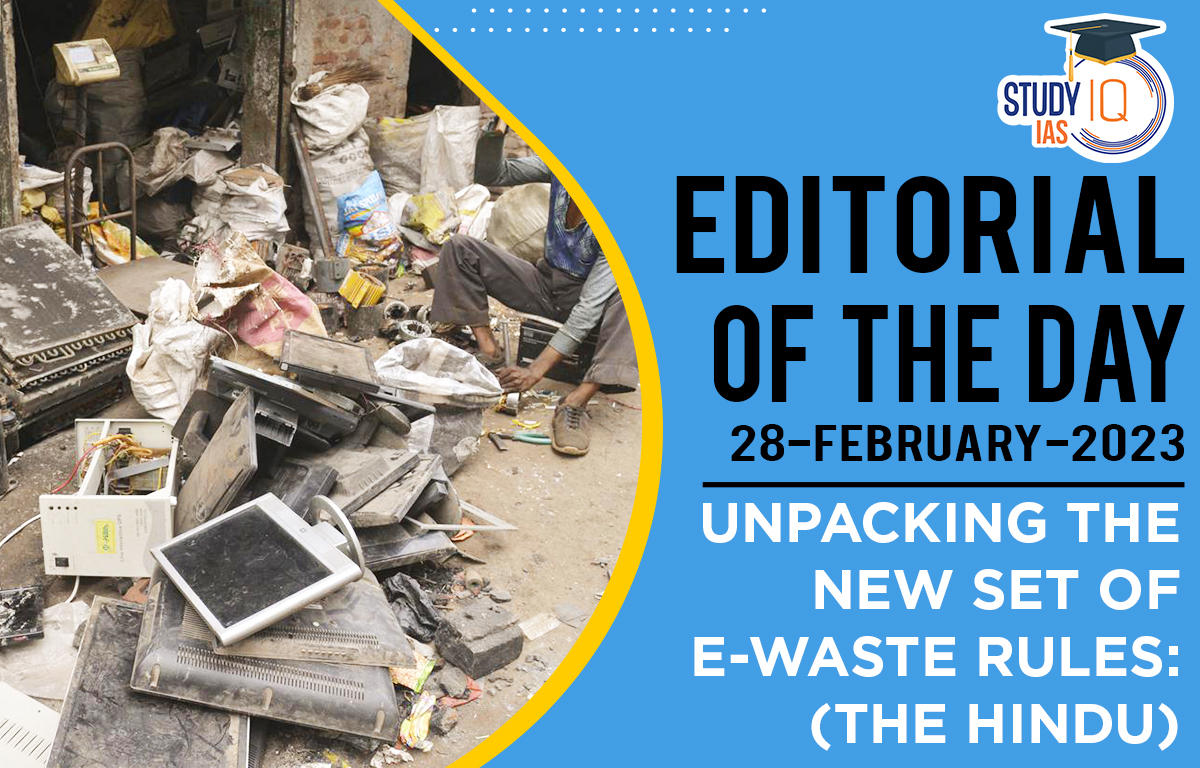Table of Contents
In an era of rapid urbanization, digitalization and population growth, the problem of e-waste management is a cross cutting and persisting challenge.
- E-waste rules 2011: The first e-waste rules were notified in 2011 and came into effect in 2012. An important component was the introduction of Extended Producer Responsibility (EPR).
- EPR made ‘producers’ responsible for the safe disposal of electronic and electric products once the consumer discards them.
- E-waste rules 2016: E-waste rules of 2016 were comprehensive and included provisions to promote ‘authorisation’ and ‘product stewardship’. New stakeholders such as Producer Responsibility Organisations (PRO) were introduced.
- E-waste Rules 2022: A new set of e-waste rules were introduced in 2022, which will come into force from April 1, 2023.
- The rules contain a provision of an EPR framework, with the focus being on the ‘Registration of Stakeholders’ (manufacturer, producer, refurbisher and recycler).
- Previous concern: Many registered formal recyclers may undertake activities only up to the segregation stage, and thereafter transfer e-waste to the informal sector.
- Addressing the concern: A digitalized approach will standardize the e-waste value chain through a common digital ‘portal’ and ensure transparency, which is crucial to reduce the ‘paper trading’ or ‘false trail’.
Drawbacks of the e-waste Rules, 2022
- Absence of Recovery ledger: An efficient e-waste recycling includes ‘component recovery’ (recovering rare earth metals) and ‘residual disposal’ (safe disposal of the leftover residues).
- Even though the rules briefly touch upon these subjects, it fails to define requirement for efficient recycling.
- There is a need to develop a system that records the quantity of e-waste that went for recycling vis-à-vis the ‘recovery’ towards the end.
- Dismantling Producer Responsibility Organisations (PRO): The new rules put onus of recycling on authorised recyclers and dismantled PROs.
- These authorised recyclers must collect e-waste, recycle them and generate digital certificates through the portal.
- By acting as an intermediary between producers and formal recyclers, PROs partially ensured ‘double verification’ in terms of quantity and quality of recycling.
- Non-recognition for informal sector: The informal sector, which is responsible for handling 95% of e-waste, draws no recognition in the new rules on account of its ‘illegality.
- In the process of e-waste collection, segregation and recycling, it is the last stage that poses a major concern.
- Since the rest of the stages do not involve any hazardous practices, informal sector should be strategically utilized for better collection of e-waste.
- Recognition for informal sector will ensure that e-waste is entered in a safe and structured system and the informal sector gains advantage in terms of financial and legal security.
Challenges for e-waste Sector
- Lack of awareness: E-waste consumers lack awareness and information about the existence of e-waste collection services.
- Lack of formalization: Formal e-waste handling companies are low in number and clustered in the metropolises. They also do not provide doorstep collection to consumers.
Way Forward
- Information dissipation: Stakeholder must have the right information about efficient and safe dispose of e-waste.
- Overhaul practices: There is a need to strengthen reverse logistics, build capacity of stakeholders, improve existing infrastructure, enhance product designing, and adopt green procurement practices.
- A robust collection and recycling system on the ground is necessary to meet legislative requirements.





















 WhatsApp
WhatsApp